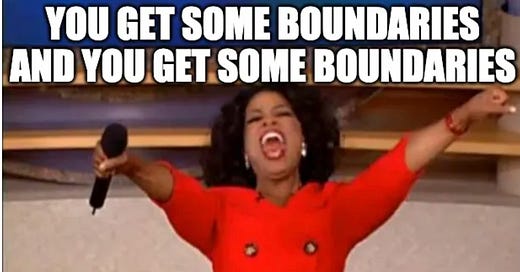The Weaponization of Boundaries
What Boundaries Actually Are Beyond "No is a complete sentence"
Hi friends! This week's episode tackles boundaries. Yep, boundaries. Who knew they could be so controversial?
We dive into what boundaries actually are (and aren't). We talk about how they've been twisted online. And we explore why nuance matters when protecting ourselves while staying connected to others.
The internet loves quick fixes. It's obsessed with viral mental health trends. But most social media posts about boundaries push the same simple ideas: "No is a complete sentence" and "Never explain yourself." Sure, these can help people who struggle to speak up. But real life is messier.
Below we'll dive into the highlights from the episode. For the full post, including homework, journal prompts, and our best tips that go beyond what we shared in the episode, upgrade your subscription.
What Boundaries Actually Are (And Aren't)
Let's start with what kicked off our chat. Remember that viral "Cut" article? A woman nearly divorced her husband because his family didn't wash their hands before touching shared food.
She called this a "boundary violation." It wasn't.
Sam nailed it when she said, "The boundary is not telling them they now have to shift their whole dynamic to cater to you. A boundary would be saying, 'I won't be eating.' That is a boundary."
Think of boundaries as the fence around your yard. You control your side. That's it. You don't get to landscape the neighbor's lawn.
Want a quick test? If it starts with "You can't..." it's probably not a boundary. If it starts with "I can't/won't..." it probably is.
In my book, I define a boundary as "an internally created guideline or limit that a person creates in order to identify what are appropriate or safe ways for others to act around you." True boundaries are about taking care of yourself, not controlling others.
The Weaponization of "My Boundaries"
We’ve noticed that “boundaries" are becoming a trump card. People throw it down to end discussions. They use it to control situations.
"That violates my boundaries!"
Boom. Instant moral high ground. The other person becomes the bad guy.
But that's not what boundaries are for. They aren't weapons. They're shields. They protect you. They don't control others.
From the episode: "A boundary is not telling someone else how they take care of their lawn. It's how you focus on your own lawn, your own house, and protecting that. It is not about controlling or changing someone else's behavior." — Amanda
When we try to control others and call it a "boundary," we're missing the point. Boundaries are distinct from demands because they're created based on what works for you, not with the intention of forcing someone else to behave in a specific way.
Keep reading with a 7-day free trial
Subscribe to Nuance Needed to keep reading this post and get 7 days of free access to the full post archives.





